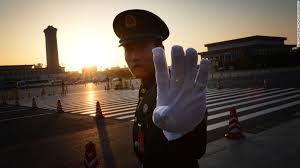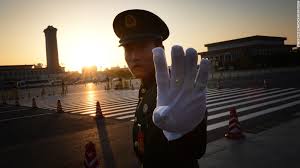
Chang Xiaobing, the boss of one of China’s biggest companies quit as chairman and chief executive of China Telecom after his detention by Beijing in what is being termed as the latest target of President Xi Jinping’s crackdown on corruption.
Chang Xiaobing was earlier detained this week on grounds of “severe disciplinary violations”.
Chang had quit in relation to the investigation, the state-owned company told the Hong Kong stock exchange.
“The board of directors hereby announces that Mr Chang Xiaobing has resigned from his positions as the executive director, chairman and chief executive officer of the company, with effect from 30 December 2015,” it said.
“Mr Chang has confirmed that he has no disagreement with the board and there is no other matter in relation to his resignation that should be brought to the attention of the shareholders of the company.”
In what is seen a Xi’s attempts to root out corruption, a number of business figures have been detained by Beijing in recent months.
In Decemebr, police had detained the head of Fosun group, China’s largest private sector conglomerate, Guo Guangchang. After “assisting in certain investigations”, he re-emerged three days later.
Two investment bankers from Citic securities were also detained in December without any plausible explanation given.
The new resulted in a slight fall in the shares of China Telecom in Hong Kong.
China Telecom said that executive director, president and chief operating officer of the company, Yang Jie, will take over until a permanent replacement for Chang.
Immediately after becoming the chief of the Communist party in November 2012, Xi announced plans for a relentless assault on corruption.
“A mass of facts tells us that if corruption becomes increasingly serious, it will inevitably doom the party and the state. We must be vigilant,” he told the politburo, a group China’s 25 most senior leaders, during one of its first meetings.
A once-unthinkable attack on some of the party’s most feared and powerful figures have since been masterminded by Xi. Charged with taking 129m yuan (£13.4m) in bribes, Zhou Yongkang, the former security tsar who once controlled China’s vast domestic security apparatus, was sentenced to life imprisonment in June this year.
Ling Jihua, the former chief of staff to President Hu Jintao, was arrested and expelled from the party next month.
As Xi attempted to rein in corruption – and political rivals – within the People’s Liberation Army, senior military figures including Guo Boxiong and Xu Caihou, were also toppled.
For his alleged involvement in organized crimes, Xi had ordered the execution of Liu Han, a Ferrari-obsessed mining tycoon who had once been worth more than £4bn, in February last year.
Dozens on top business figures have found themselves in Xi’s crosshairs, with many missing after questioning, since China’s stock market meltdown in July.
Shockwaves ran through the international business community this month after the brief and as yet unexplained detention of Guo Guangchang, a billionaire tycoon some call China’s Warren Buffett.
There is little sign of his anti-corruption drive slowing as Xi Jinping enters his fourth year in power. Some even speculate whether Communist party titans such as former president Jiang Zemin or former prime minister Wen Jiabao are in the sight of Xi.
Senior party leaders should “strictly educate and supervise” their children and family members, Xi told officials this week.
(Source:www.reuters.com)
Chang Xiaobing was earlier detained this week on grounds of “severe disciplinary violations”.
Chang had quit in relation to the investigation, the state-owned company told the Hong Kong stock exchange.
“The board of directors hereby announces that Mr Chang Xiaobing has resigned from his positions as the executive director, chairman and chief executive officer of the company, with effect from 30 December 2015,” it said.
“Mr Chang has confirmed that he has no disagreement with the board and there is no other matter in relation to his resignation that should be brought to the attention of the shareholders of the company.”
In what is seen a Xi’s attempts to root out corruption, a number of business figures have been detained by Beijing in recent months.
In Decemebr, police had detained the head of Fosun group, China’s largest private sector conglomerate, Guo Guangchang. After “assisting in certain investigations”, he re-emerged three days later.
Two investment bankers from Citic securities were also detained in December without any plausible explanation given.
The new resulted in a slight fall in the shares of China Telecom in Hong Kong.
China Telecom said that executive director, president and chief operating officer of the company, Yang Jie, will take over until a permanent replacement for Chang.
Immediately after becoming the chief of the Communist party in November 2012, Xi announced plans for a relentless assault on corruption.
“A mass of facts tells us that if corruption becomes increasingly serious, it will inevitably doom the party and the state. We must be vigilant,” he told the politburo, a group China’s 25 most senior leaders, during one of its first meetings.
A once-unthinkable attack on some of the party’s most feared and powerful figures have since been masterminded by Xi. Charged with taking 129m yuan (£13.4m) in bribes, Zhou Yongkang, the former security tsar who once controlled China’s vast domestic security apparatus, was sentenced to life imprisonment in June this year.
Ling Jihua, the former chief of staff to President Hu Jintao, was arrested and expelled from the party next month.
As Xi attempted to rein in corruption – and political rivals – within the People’s Liberation Army, senior military figures including Guo Boxiong and Xu Caihou, were also toppled.
For his alleged involvement in organized crimes, Xi had ordered the execution of Liu Han, a Ferrari-obsessed mining tycoon who had once been worth more than £4bn, in February last year.
Dozens on top business figures have found themselves in Xi’s crosshairs, with many missing after questioning, since China’s stock market meltdown in July.
Shockwaves ran through the international business community this month after the brief and as yet unexplained detention of Guo Guangchang, a billionaire tycoon some call China’s Warren Buffett.
There is little sign of his anti-corruption drive slowing as Xi Jinping enters his fourth year in power. Some even speculate whether Communist party titans such as former president Jiang Zemin or former prime minister Wen Jiabao are in the sight of Xi.
Senior party leaders should “strictly educate and supervise” their children and family members, Xi told officials this week.
(Source:www.reuters.com)





